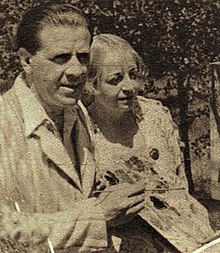Svatopluk Innemann
Svatopluk Innemann (born February 18, 1896 in Laibach , Carniola ; † October 30, 1945 in the Klecany internment camp ) was a Czechoslovak film director , cameraman , cutter , screenwriter and actor . He is one of the pioneers of Prague filmmaking.
Live and act
Svatopluk Innemann was born in Ljubljana as the son of the Prague director and actor Rudolf Inemann (1861–1907) and the opera singer Ludmila Lvová-Innemannová (1868–1956) . He was the middle of three brothers; his older brother Miroslav (1894–1953) was also active in the film business. His sister Liduška Innemannová (1905–1968) also played as a youth actress in a film.
After his parents returned to Bohemia, Innemann first completed an apprenticeship as a selcher in Prague . In 1918 he worked with Otto Heller for the first time in film as a cameraman for the feature film Československý Ježíšek , which made the return of the Czechoslovak legionnaires the subject. A year later, he began filming on his own and also took on minor roles. In 1920 Innemann married the actress Zdena Kavková (1896–1985). In the same year he started working as a film director. Between 1919 and 1930 he made 16 silent films, his first sound film was Fidlovačka (1930). Svatopluk Innemann made a total of 35 films by 1937 - mostly operetta films, comedies and melodramas , but also documentaries. In some of his films his wife, mother and aunt Marie Oliaková (1876–1942) played with. His comedies Z českých mlýnů (1925) and Muži v offsidu (1931) as well as the crime film Vražda v Ostrovní ulici (1933), also the first film produced in the new Barrandov film studios, were particularly successful . His most important works include the biographical equipment film Josef Kajetán Tyl (1925), the film Poslední bohém (1931) about Jaroslav Hašek , and the drama Před maturitou (1932), made together with Vladislav Vančura . His last cinematic work was Švanda dudák (1937) based on the dramatic fairy tale Strakonický dudák aneb Hody divých žen ( The Bagpiper of Strakonitz ) by Josef Kajetán Tyl .
At the end of the 1930s Innemann fell ill with a mental disorder and received psychiatric treatment. After the German occupation , Innemann and Zdena Kavková applied for German citizenship in 1939. Innemann intended to perform a play about Hitler at the Modern Theater in Prague . His wife was also involved with the occupiers and spoke on the radio in the propaganda basketball bands Hvězdy nad Baltimore and Haló, volá Londýn , where she appeared as Hana Benešová; She also did spy services for the Gestapo under the code name Silly . After the Red Army captured Prague , Innemann and Zdena Kavková were arrested as collaborators. Svatopluk Innemann was taken to the Klecany internment camp , where he died on October 30, 1945.
In 2007 the Volksbund Deutsche Kriegsgräberfürsorge ( Volksbund Deutsche Kriegsgräberfürsorge) recovered from a mass grave the bones of 41 deceased from the Klecany camp, including most likely the remains of Svatopluk Innemann, and buried them in the new German war cemetery in Cheb in 2008 .
Filmography (selection)
- Červená Karkulka (1920), director
- Komptoiristka (1922), director
- Z českých mlýnů (1925), director
- Josef Kajetán Tyl (1925), director
- Švejk v ruském zajetí (1926), director
- Plukovník Švec (1929), director
- Vražda v Ostrovní ulici (1933), director
Web links
- Svatopluk Innemann in the Internet Movie Database (English)
- Svatopluk Innemann In: Česko-Slovenská filmová databáze
- Literature by and about Svatopluk Innemann in the bibliographic database WorldCat
Individual evidence
- ↑ Prague film pioneer rests on German war cemetery in Eger / Cheb / Svatopluk Innemann was reburied in Eger in 2008 / The legal historian Otto Peterka is also among the dead in Eger , VDK press release from August 16, 2010
| personal data | |
|---|---|
| SURNAME | Innemann, Svatopluk |
| BRIEF DESCRIPTION | Czechoslovak film director, cameraman, screenwriter and actor |
| DATE OF BIRTH | February 18, 1896 |
| PLACE OF BIRTH | Laibach |
| DATE OF DEATH | October 30, 1945 |
| Place of death | Klecany |
